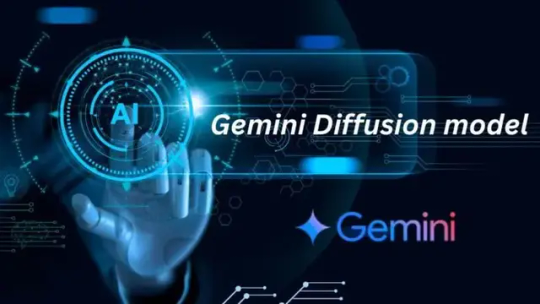#GeminiDiffusionmodel
Explore tagged Tumblr posts
Text
Gemini Diffusion: Google’s new Experimental Research Model

Gemini Dispersion
Google DeepMind developed Gemini Diffusion, an experimental research model. A cutting-edge text dissemination model, it's called. Gemini Diffusion is a DeepMind AI prototype.
The model uses diffusion to model language. This method differs from autoregressive language models. Traditional autoregressive models sequentially output text. This sequential arrangement may reduce content quality and coherence and hinder productivity.
However, diffusion models learn outputs by gradually improving noise. Instead of anticipating text linearly, they iteratively process chaotic input to produce coherent output. This iterative refinement approach lets diffusion models quickly test solutions. They can also correct generation errors, which is useful. They excel at code and math editing due to their iterative improvement and error repair abilities. The latest Google DeepMind image and video synthesis models learn to produce outputs by turning random noise into intelligible text or code.
Gemini Diffusion's main capabilities from this diffusion approach are:
Quick response: Gemini Diffusion produces information faster than Google's fastest model. All evaluated activities average 1479 tokens per second without overhead. The overhead is 0.84 seconds.
Unlike autoregressive models, Gemini Diffusion creates blocks of tokens at once, making language more cohesive. This method makes the model respond to user queries more logically.
Iterative refinement: The model can correct generation errors to produce more trustworthy outputs.
Benchmarks
Despite being speedier, Gemini Diffusion's external benchmark scores are comparable to larger models. Insiders say it codes as fast as Google's fastest model. Benchmarks compare Gemini Diffusion to Gemini 2.0 Flash-Lite in several domains:
Code: LBPP (v2), MBPP (76.0% vs. 75.8%), and LiveCodeBench (v6) yield higher results for Gemini Diffusion. On BigCodeBench (45.8% vs. 45.4%), SWE-Bench Verified (28.5% vs. 22.9%), and HumanEval (90.2% vs. 89.6%), Gemini 2.0 Flash-Lite performs slightly better SWE-Bench Verified uses a non-agentic evaluation (single-turn edit only) with a 32K prompt length.
Science: Gemini 2.0 Flash-Lite outperforms Gemini Diffusion on GPQA Diamond (56.5% vs. 40.4%).
Mathematics AIME 2025 score is 23.3% for Gemini Diffusion, up from 20.0%.
Reason: Gemini 2.0 Flash-Lite scores 21.0% on BIG-Bench Extra Hard versus 15.0%.
Gemini 2.0 Flash-Lite has a higher Global MMLU (Lite) score (79.0% vs. 69.1%). No majority voting was used in the benchmark technique, hence all outcomes are pass@1. The AI Studio API ran the Gemini 2.0 Flash-Lite tests for comparison using the model-id gemini-2.0-flash-lite and default sampling parameters.
Gemini Diffusion is available for experimentation. With this internal demo, future models are produced and refined. Anyone can join the demo waitlist.
The Gemini Diffusion study of diffusion for text generation aims to give users more control, creativity, and speed when writing. Google DeepMind is using diffusion to improve its models' efficiency and effectiveness.
#GeminiDiffusion#Gemini#GeminiDiffusionmodel#GoogleDeepMind#GoogleDeepMindresearchmodel#Googleresearchmodel#technology#technews#technologynews#news#govindhtech
0 notes